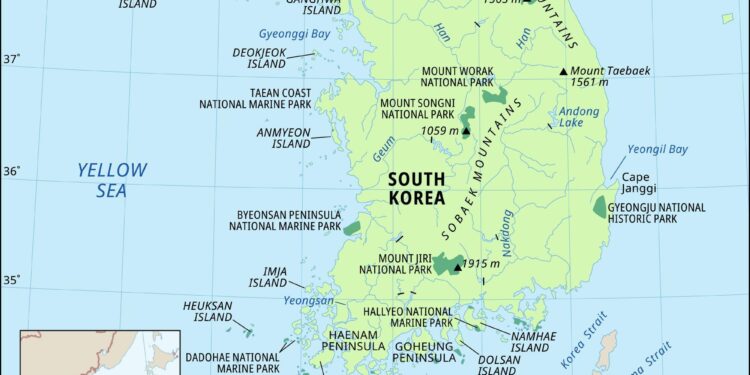South Korea’s New Presidency: Redefining Relations with China Amidst Shifting Geopolitics
With the inauguration of South Korea’s latest presidential administration, global observers are closely examining how this leadership change will influence the country’s foreign policy, especially its complex relationship with China. As geopolitical tensions intensify across East Asia and beyond, Seoul’s diplomatic posture toward Beijing is poised to become a defining factor in regional stability. Given China’s dual role as South Korea’s largest trading partner and a strategic competitor, the new president’s policies could significantly alter economic ties and security alignments alike.
Emerging Directions in Seoul-Beijing Relations Under New Leadership
The transition to President Yoon Suk-yeol’s government signals a potential recalibration of South Korea’s approach toward China. Unlike his predecessor’s relatively cautious diplomacy, Yoon advocates for a more assertive foreign policy that balances economic pragmatism with heightened security concerns. This shift reflects broader trends where nations in the Indo-Pacific are reassessing their strategies amid growing U.S.-China rivalry.
Key anticipated changes include:
- Enhanced Defense Partnerships: Strengthening military cooperation with allies such as the United States and Japan aims to bolster deterrence capabilities against regional threats.
- Reevaluation of Trade Policies: Revisiting trade agreements and technology exchanges through a national security lens may lead to stricter controls on sensitive sectors.
- A More Vocal Human Rights Agenda: Incorporating human rights advocacy into diplomatic dialogues could challenge Beijing on issues like Hong Kong or Xinjiang, signaling Seoul’s commitment to international norms.
This evolving stance underscores South Korea’s delicate balancing act—maintaining robust economic engagement while addressing strategic vulnerabilities posed by China’s rising influence.
The Intersection of Economic Innovation and Security Strategy
The new administration is pursuing an integrated strategy that combines forward-looking economic initiatives with comprehensive security measures. Central to this vision is fostering innovation-driven growth aligned with global sustainability goals—a move designed not only to enhance competitiveness but also reduce dependency on any single market or supply chain vulnerable to geopolitical disruptions.
- Pursuit of Advanced Trade Agreements: Emphasizing partnerships that facilitate cutting-edge technological collaboration while safeguarding intellectual property rights.
- Sustainability Investments: Accelerating development in green energy sectors such as hydrogen fuel cells and renewable infrastructure consistent with international climate commitments.
- Diversified Alliances for Security Cooperation: Expanding joint exercises and intelligence sharing beyond traditional partners to include emerging regional stakeholders concerned about stability challenges posed by North Korean provocations or cyber threats.
This dual focus reflects an understanding that economic resilience must be matched by proactive defense postures amid an increasingly volatile environment marked by hybrid warfare tactics and asymmetric risks.
Navigating Diplomatic Engagements With Beijing Amid Heightened Regional Frictions
A nuanced diplomatic framework will be essential for managing relations between Seoul and Beijing during this period marked by intensified competition yet unavoidable interdependence. Constructive dialogue channels should be prioritized alongside confidence-building measures designed to prevent miscalculations that could escalate tensions further across contested domains such as maritime boundaries or technological standards governance.
- Cultural Diplomacy Initiatives: Expanding academic exchanges, joint cultural festivals, and youth programs can foster mutual understanding at grassroots levels—softening political friction over time through people-to-people connections rather than state-centric narratives alone.
- Economic Collaboration Projects: Joint ventures focusing on emerging fields like AI ethics frameworks or environmental remediation technologies offer shared benefits reinforcing cooperative incentives despite broader rivalry dynamics.
- Pursuit of Multilateral Forums Participation: Engaging actively within ASEAN-led platforms or East Asia Summit mechanisms helps position South Korea as both mediator and consensus-builder among competing interests in the region.
| Diplomatic Strategy | Expected Impact |
|---|---|
| Deepening US-South Korea Military Ties | Stronger deterrence capacity; risk provoking Chinese countermeasures |
| Expanding Bilateral Economic Engagement With China | Improved trade terms; potential vulnerability from overreliance |
| Championing Regional Multilateral Cooperation | Reduced unilateral actions; enhanced collective security frameworks |
| Promoting Cross-Cultural Exchanges Between Citizens | Elevated public goodwill; increased soft power leverage over time
Improved bilateral trust leading towards long-term stability
|
An effective policy will require acknowledging historical sensitivities while forging innovative pathways forward—leveraging South Korea’s unique position bridging major powers without sacrificing sovereignty or strategic autonomy. By emphasizing transparency regarding intentions alongside pragmatic cooperation efforts, Seoul can help ease anxieties inherent within Sino-Korean relations today.
A Forward-Looking Perspective: Implications for East Asian Stability
The election of President Yoon marks more than just a domestic political milestone—it represents a critical juncture influencing East Asia’s future trajectory amid intensifying great power competition. Whether his administration opts for bold realignment or measured continuity remains under close watch from capitals worldwide.
The choices made now concerning engagement strategies toward China will reverberate throughout multilateral institutions shaping trade rules, security architectures, climate action commitments—and ultimately peace prospects across one of the world’s most dynamic regions.
As analysts dissect unfolding developments from Seoul—from defense pacts signed at Washington summits to green tech collaborations launched domestically—the global community gains valuable insights into how middle powers navigate complexity amidst shifting alliances.
In sum, South Korea stands at crossroads where diplomacy must blend firmness with flexibility—crafting policies resilient enough for present challenges yet adaptable enough for uncertain futures ahead.
The coming years promise pivotal moments defining not only bilateral ties but also wider regional equilibrium—with implications extending well beyond Northeast Asia itself.














